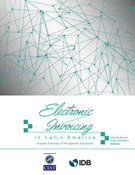Electronic Invoicing in Latin America
Date
Mar 2018
EDITOR
Barreix, Alberto Daniel;Zambrano, Raul
The electronic invoicing (EI) of taxes is one of Latin America’s contributions to international taxation in support of the fight against evasion, global efforts towards tax transparency, and the digitization of tax administrations (TAs). Initially, EI was conceived as an instrument of documentary control over the invoicing process, so as to avert both the omission of sales and the inclusion of false purchases. The original idea was extended to other areas of tax control, such as payroll, goods in transit, and new services such as factoring. To some extent, EI can be regarded as the start of the process of digitizing the TAs in the broad sense. This publication addresses the pioneering experience of EI in Latin America, from its implementation to its extensions and impact on tax collection.



